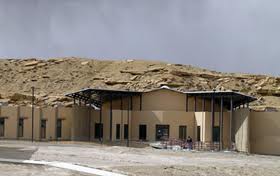
- Details
- By Native News Online Staff
CROWNPOINT, N.M. — Navajo Technical University (NTU) has received a $2.5 million grant from the National Science Foundation (NSF) to support STEM instruction and research.
The grant was awarded under the NSF’s Tribal Colleges and Universities Program that promotes STEM instruction and research.
NTU will use the grant to expand its engineering department by establishing a baccalaureate degree program in Environmental Engineering. The NTU’s will focus on uranium mine remediation and mitigation with the new program.
NTU professor Harry S. Whiting II, who teaches industrial engineering, plans to partner with outside organizations to assist in researching environmental issues on the Navajo Nation. Partners will include higher education institutions, such as the University of Idaho and the University of Arizona, and private companies, such as Tetra Tech, an environmental service company based in California.
“It’s a daunting task,” said Whiting, noting the amount of data collection and analysis that needs to take place. “Our first priority is to update the maps we are currently using to locate problematic areas.”
The Navajo Nation has numerous uranium mines that have yet to be remediated, most notably the Church Rock uranium mill spill in 1979. The university and its partners will begin locating and mapping locations across the Navajo Nation prior to initiating the remediation process. According to the Environmental Protection Agency, there are over 500 abandoned uranium mines on the Navajo Nation.
Currently, NTU offers an Associate of Applied Science Degree and a Bachelor’s of Science in Environmental Science and Natural Resources. NTU also offers engineering focused programs in Pre-Engineering, Engineering Technology, and Chemical Engineering Technology. The university’s Industrial Engineering and Electrical Engineering programs are ABET accredited.
More Stories Like This
Bard College Center for Indigenous Studies (CfIS) Hosts Annual Symposium With Keynote Speaker Miranda Belarde-Lewis on March 9–10American Indian College Fund Announces Spring 2026 Faculty Fellow Cohort
Navajo Nation Signs $19 Million Diné Higher Education Grant Fund Act into Law
Dr. Shelly C. Lowe to Be Inaugurated as IAIA President March 26–27
Tlingit Language Courses Expand for Students to Learn With Families At-Home
Help us defend tribal sovereignty.
At Native News Online, our mission is rooted in telling the stories that strengthen sovereignty and uplift Indigenous voices — not just at year’s end, but every single day.
Because of your generosity last year, we were able to keep our reporters on the ground in tribal communities, at national gatherings and in the halls of Congress — covering the issues that matter most to Indian Country: sovereignty, culture, education, health and economic opportunity.
That support sustained us through a tough year in 2025. Now, as we look to the year ahead, we need your help right now to ensure warrior journalism remains strong — reporting that defends tribal sovereignty, amplifies Native truth, and holds power accountable.
 The stakes couldn't be higher. Your support keeps Native voices heard, Native stories told and Native sovereignty defended.
The stakes couldn't be higher. Your support keeps Native voices heard, Native stories told and Native sovereignty defended.
Stand with Warrior Journalism today.
Levi Rickert (Potawatomi), Editor & Publisher

